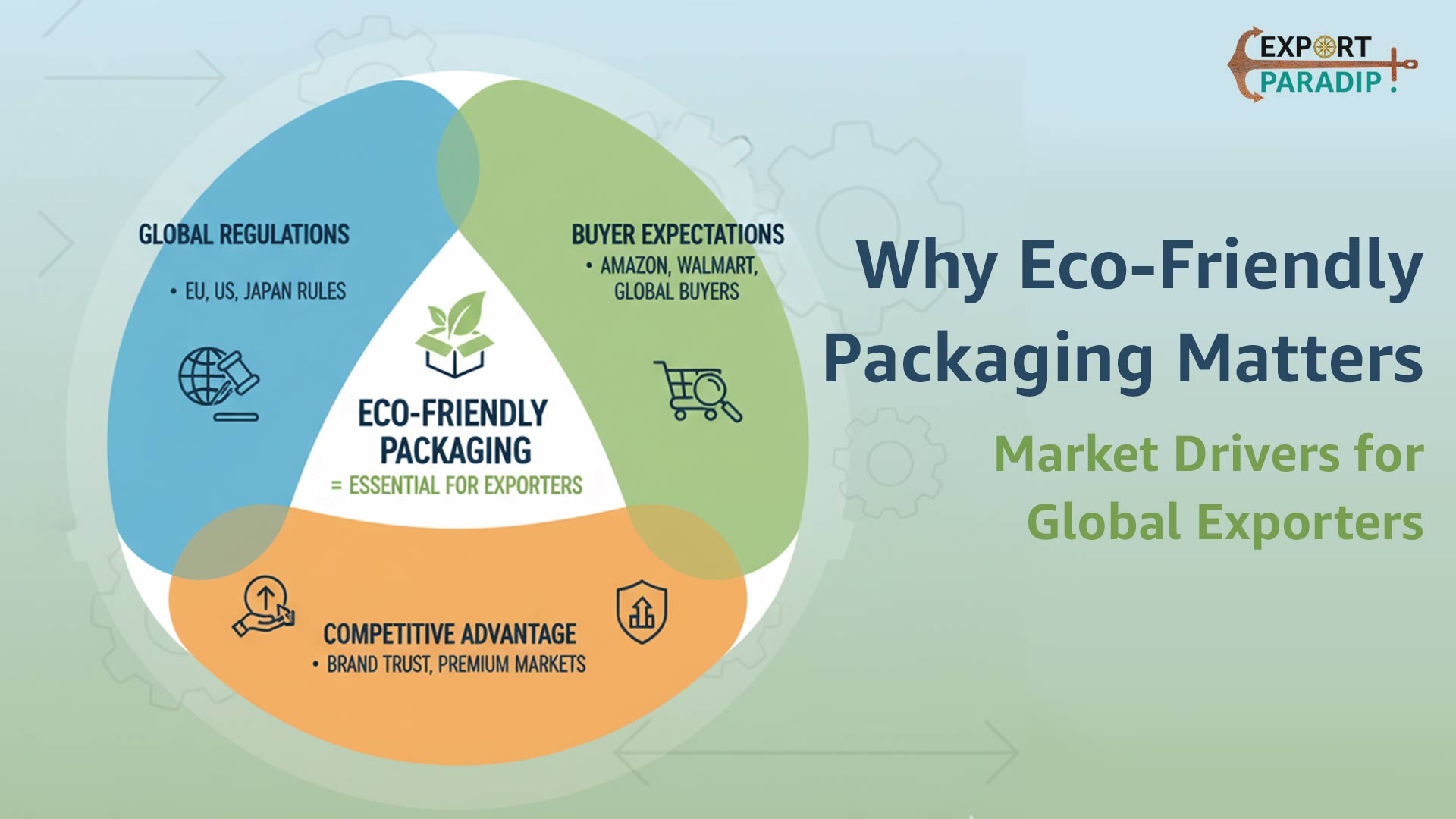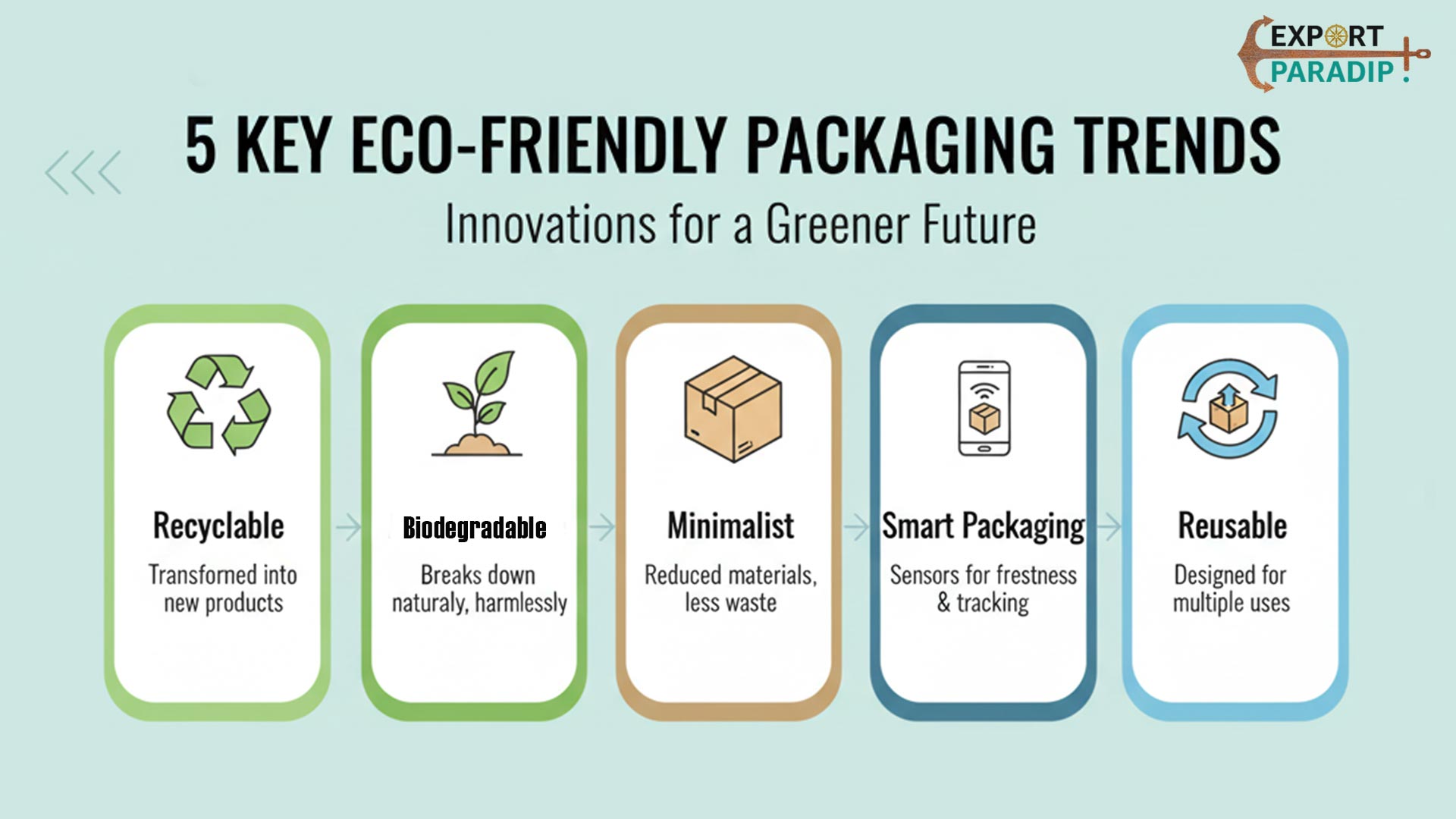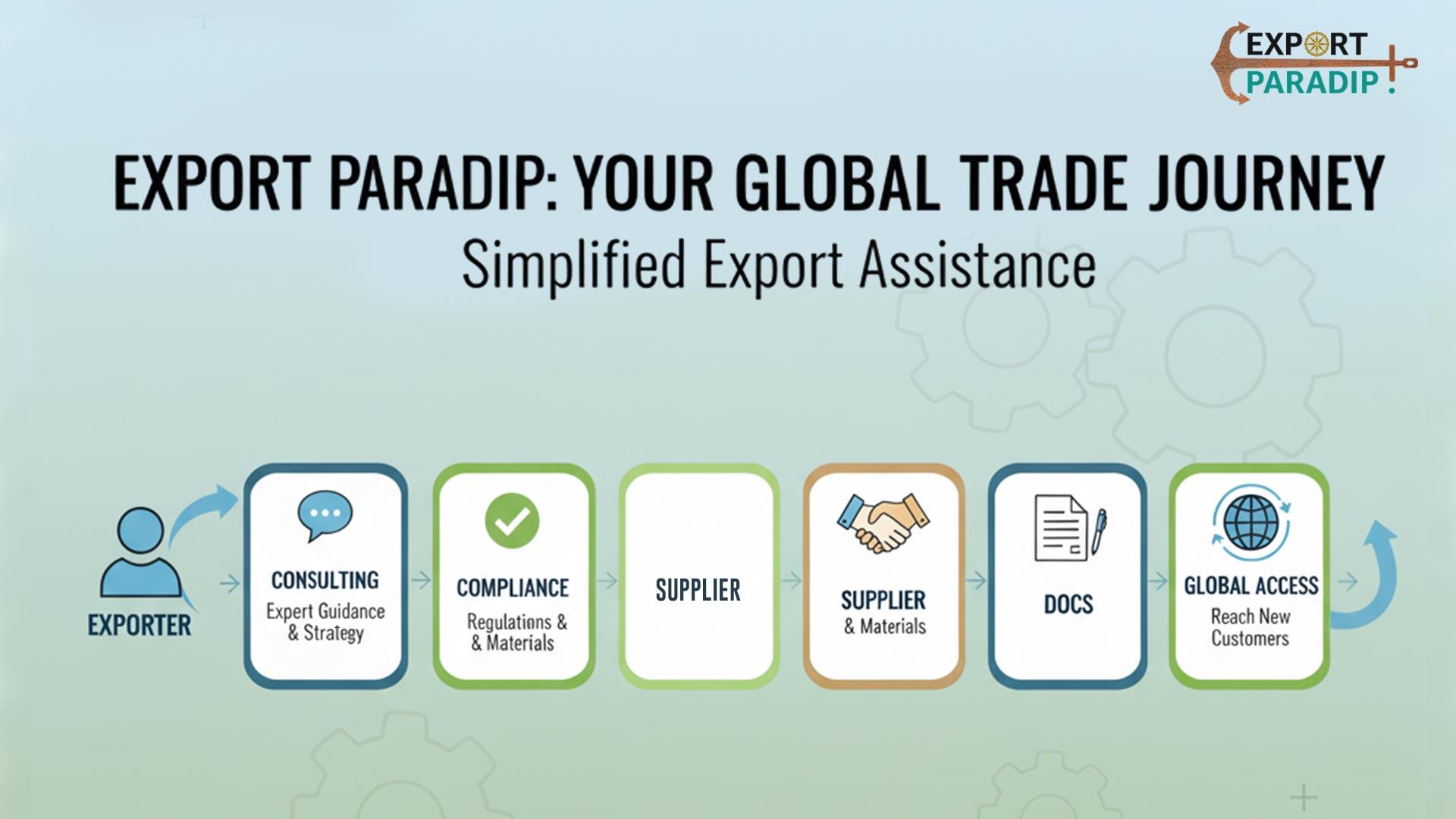Eco-Friendly Packaging for International Shipping: Trends Shaping the Future of Global Trade
 As international trade expands, global buyers & regulators are demanding eco-friendly, sustainable packaging solutions. For Indian exporters, this shift is more than just an environmental responsibility, it’s a business necessity. Packaging is no longer only about protecting goods, it’s also about meeting international sustainability requirements, reducing carbon footprints & aligning with buyer expectations.
As international trade expands, global buyers & regulators are demanding eco-friendly, sustainable packaging solutions. For Indian exporters, this shift is more than just an environmental responsibility, it’s a business necessity. Packaging is no longer only about protecting goods, it’s also about meeting international sustainability requirements, reducing carbon footprints & aligning with buyer expectations.
At Export Paradip, we help exporters adapt to these changing global trends. From guiding businesses on eco-friendly materials to ensuring compliance with international packaging regulations, our team supports exporters in achieving both sustainability & profitability in global markets.
In this blog, we’ll explore the latest eco-friendly packaging trends for international shipping, the global regulations driving this shift & how Export Paradip empowers exporters to stay competitive & future-ready.
1. Why Eco-Friendly Packaging Matters in International Trade
📦 The Shift in Buyer Expectations
Global buyers in the EU, USA & Japan are now demanding sustainable packaging from their suppliers. Major retailers like Amazon, Walmart & Carrefour have strict packaging guidelines emphasizing recyclability & waste reduction.
🌱 Environmental Compliance
Many countries have introduced packaging waste directives, limiting the use of plastics & mandating recycling targets. Exporters that fail to comply face rejections, penalties or even bans from international markets.
📈 Competitive Advantage
Eco-friendly packaging creates a positive brand image, helping exporters attract premium buyers who value sustainability. Companies with green packaging practices often get access to exclusive supply contracts.
2. International Regulations on Sustainable Packaging
Exporters must comply with various global packaging standards to ship internationally. Here are key regulations:
2.1 European Union (EU Packaging Directive)
- Limits single-use plastics.
- Requires packaging to be recyclable, reusable or compostable.
- Extended Producer Responsibility (EPR) laws put accountability on exporters.
2.2 United States (Sustainable Packaging Act – State Level Regulations)
- California, New York & Washington mandate recycling & plastic reduction.
- FDA guidelines for safe food packaging.
2.3 Japan & South Korea
- Strict recycling laws for plastic, Styrofoam & paper packaging.
- Eco-label requirements on packaging.
2.4 Middle East & Africa
- Growing emphasis on biodegradable packaging, especially for food exports.
💡 Export Paradip’s Advantage: Our team keeps exporters updated on international packaging laws, ensuring that shipments remain compliant & globally accepted.
3. Emerging Eco-Friendly Packaging Trends

a. Recyclable Packaging Materials
Corrugated cardboard, recycled paper & PET bottles are gaining popularity. Exporters use mono-material packaging for easier recycling.
b. Biodegradable & Compostable Packaging
Materials like PLA bioplastics, cornstarch packaging & mushroom-based packaging are eco-friendly options. Particularly relevant for food & marine product exports.
c. Minimalist Packaging
Reducing excessive layers of packaging helps save costs & reduce waste. Optimized designs lower shipping weights, cutting down carbon emissions.
d. Smart Packaging with Sustainability Features
QR codes & digital tags for traceability. Packaging that communicates recycling instructions to end consumers.
e. Returnable & Reusable Packaging
Used in B2B exports (machinery, electronics). Crates, pallets & containers designed for multiple uses.
4. How Eco-Friendly Packaging Supports Exporters
- Market Access: Compliance with EU/US rules opens premium markets.
- Reduced Costs in the Long Run: Lightweight eco-materials reduce shipping costs.
- Brand Recognition: Sustainable exporters gain higher visibility.
- Buyer Trust: International buyers prefer eco-certified partners.
5. Challenges Exporters Face with Eco-Friendly Packaging
- Higher Initial Costs: Eco-materials can be more expensive than traditional plastic.
- Supply Chain Gaps: Limited availability of sustainable packaging in local markets.
- Complex Regulations: Varying requirements across countries can confuse exporters.
💡 Export Paradip Solution: We bridge these gaps by:
- Connecting exporters with reliable eco-packaging suppliers.
- Providing guidance on cost-effective sustainable alternatives.
- Ensuring compliance with global buyer packaging requirements.
6. How Export Paradip Helps Exporters with Sustainable Packaging
 At Export Paradip, we don’t just guide exporters through the shipping process, we ensure they are future-ready & globally compliant.
At Export Paradip, we don’t just guide exporters through the shipping process, we ensure they are future-ready & globally compliant.
✅ Our Support Includes:
- Sustainability Consulting: Advising exporters on eco-packaging trends.
- Compliance Guidance: Ensuring packaging meets EU, US & Asian regulations.
- Supplier Connections: Linking exporters with certified eco-friendly packaging manufacturers.
- Documentation Assistance: Helping with packaging certification & labeling for international markets.
- Marketing Advantage: Positioning exporters as eco-conscious brands to attract premium buyers.
7. Future of Eco-Friendly Packaging in Global Trade
The future is green, digital & efficient:
- AI-driven packaging optimization will reduce material use.
- Blockchain-enabled traceable packaging will become a buyer demand.
- Governments will impose stricter bans on non-sustainable materials.
For Indian exporters, adapting to eco-friendly packaging is no longer optional, it’s a survival strategy. With Paradip Port’s advanced facilities & Export Paradip’s expert guidance, businesses can achieve sustainability & growth together.
✅ Conclusion
Eco-friendly packaging is reshaping international shipping. From biodegradable materials to minimalist, traceable packaging designs, exporters must adapt to stay competitive in global markets.
With growing international regulations & shifting buyer expectations, businesses need a trusted partner who can simplify the journey. That’s where Export Paradip plays a key role, guiding exporters to adopt sustainable packaging practices, ensure compliance with global trade rules & expand into new international markets confidently.
Paradip’s world-class infrastructure + Export Paradip’s expertise = Sustainable, Future-Ready Global Trade.
FAQs
Why is eco-friendly packaging important for exporters?
Eco-friendly packaging is crucial because many international markets (EU, US, Japan) require compliance with sustainability laws. It also helps exporters build trust with buyers & reduces environmental impact.
Which eco-friendly packaging materials are most popular in global shipping?
Recyclable cardboard, biodegradable plastics, compostable cornstarch packaging & reusable crates/pallets are among the most widely adopted materials.
How can Export Paradip help with sustainable packaging?
Export Paradip assists exporters by connecting them with certified packaging suppliers, guiding them on international compliance & helping promote their eco-conscious practices to global buyers.
Does eco-friendly packaging increase export costs?
While initial costs may be higher, eco-packaging reduces shipping weights, carbon taxes & compliance risks, making it more cost-effective in the long run.
Which markets have the strictest packaging sustainability rules?
The European Union has the most comprehensive packaging directives, followed by the United States (state-level rules) & Japan/South Korea with strict recycling & eco-label requirements.
